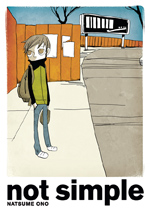 By Natsume Ono
By Natsume Ono
320 pages, black and white
Published by Viz
I think a lot of people have a fixed idea in their minds of what all manga looks like. Depending on the person’s age, it’s probably something like Katsuhiro Otomo’s Akira, or Akira Toriyama’s Dragonball Z. It’s almost certainly, though, not anything like Natsume Ono’s not simple. I think it was the incredibly distinctive look of not simple that initially attracted me to the book, but the more I read it, the deeper I was pulled into the book. For a book that starts at the conclusion and then jumps into the past to explain how everything got to that point, not simple manages to hold the reader’s interest quite well.
It’s funny, because at first not simple actually seems fairly stereotypical. A case of mistaken identity, a scheming girlfriend, it’s all by the book. But once the book gets rolling, not simple gains a lot more depth. I think part of the problem with that introductory chapter is that the focus isn’t on Ian—the main character of not simple—but a young woman named Irene. Irene is the most stereotypical part of the book, and aside from the conclusion of the story, she doesn’t play a large role. It’s a strange early misstep in not simple, especially because Ian himself is such a more compelling character. He’s not necessarily deep, forever wearing his heart on his sleeve. All he really wants is happiness for him and his family, but it’s everyone else around him that keeps things from being, well, not terribly simple.
At first the family aspect of not simple bothered me because once the initial information gets out to the reader, it’s hard to not find Ian to be a little clueless about what’s really happening. The further I read, though, the more I realized it’s a deliberate tactic on Ono’s part. While Ian drives not simple forward, she’s doing so with a slightly naive, innocent character. The supporting cast of not simple—his mother, his sister, and his journalist friend—all have their own secrets that they hide from Ian, because all of them stand to change their relationship with Ian. Considering the horrible things that happen to and around him throughout the book, Ian’s purity serves almost as a beacon that shines throughout the darkness, especially when you realize that this is a book where every single character regularly deceives the protagonist. So while Ono is letting on to the reader just what Ian’s family secrets are, his own innocence in the matter is something that you start to actively want to see maintained, because at any given moment you’re afraid that his entire world will come crashing down around him.
It’s the art in not simple, though, that made me initially sit up and take notice. If you’d walked up to me on the street and shown me the book out of context, I probably would have guessed that Love The Way You Love‘s Marc Ellerby drew not simple. It’s a young looking style, one that uses a minimum of lines to bring its characters together. It fits quite strongly with Ono’s script, though. When you look at Ian’s young face just beaming out at the reader despite his hardships, you see that exuberance and excitement just shining through. It’s that lightness that helps move the story forward; if this had been drawn in a dark, depressing manner it might have become too uncomfortable to read about. Instead, though, we’ve got Ian’s big grin and cheerful expression to keep pushing us through the book. Ono can handle the heavy stuff as well, mind you. There are some looks on people’s faces that just seem so sad, or beaten down, that I found myself actually cringing. Don’t ever mistake Ono’s style as being simple, because it’s anything but, and able to convey a great deal to the reader.
By the time I was done with not simple, I found myself eager to read more of Ono’s work. Fortunately, this looks to be just the tip of the iceberg for Ono in North America. Her series House of Five Leaves is being serialized on Viz’s SIGIKKI website, and I’m rapidly becoming enthralled with her work there. Additionally, SIGIKKI is offering up a preview of not simple to hopefully lure in more readers. It’s nice to see Viz pushing Ono’s work, because it’s so distinctly different from what a lot of people would think of as manga. It’s a big stepping stone to see more differently-styled imports from Japan, and I’m eager to see them. Until then, though, I’ll settle for more translations of Ono’s comics. Check it out.
Purchase Links: Amazon.com | Powell’s Books
